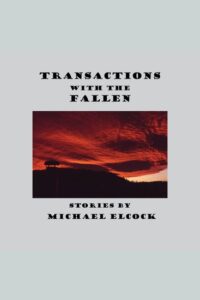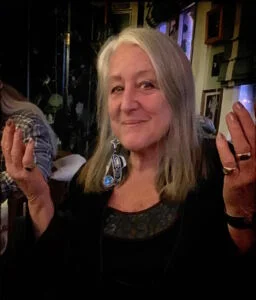Souls transforming
Transactions With the Fallen
by Michael Elcock
Oakville: Rock’s Mills Press, 2024
$25.00 / 9781772443233
Reviewed by Linda Rogers
*

With this memorable book of memento mori, Victoria resident Michael Elcock presents a collection of sacred occasions, objets de vertu, memories blessed and cursed, as written by a rolling stone gathering life’s transactions and reminding us to live.
In the dedication to his stories, Elcock (Eyes of Rain and Ragged Dreams: Coming of Age in Edinburgh) introduces himself as shapeshifter: father, witness, and guardian to a child about to leave home and embark on her own journey, perhaps parallel to his. He does not interrupt her sleep with his own emotions or agenda. That is not his job. His job is to record.
Life, if we are to believe the poet John Milton and the devil, or maybe Mister Mar-a-Lago, is divided into two sections, as is this book of memoir-as-fiction, or life-informed stories. Most people learn to negotiate the coming-of-age process through a series of transactions with authority—parents, teachers, and the bully down the lane. These engagements constitute the Fall, as deranged babies become compromised humans. Elcock is the compassionate witness to a child, maybe himself or many children, entering the life cycle.
The exegesis is this: in Night Noises, a section of linked stories of innocence, his child suffers a loss of faith as injustices pile up and leave him less than a raging emissary for the angel choir. As revelations tiptoe in to shock and surprise, he becomes a witness. Although little boys come to the world tuned for a righteous life, trauma forces them to trade angel harps for blues harmonicas as negative agency transforms them from good boys to “little reptiles” in repulsive betrayals of child rights. Not so the observer, whose morality is informed by the immorality of miscreants.
“Condemnant quo non intelligunt. Hoc malum possit esse quod factum est” (how well our ancestors understood current political debate and the new child crises). These old words could be an anthem for our era, the importance of listening and learning, transforming the shibboleths that have divided us into a more inclusive reality. These stories, the soul of a reporter transforming into the seraph of our combined better nature, neurodiverse, gender diverse, ethnodiverse, are the notes from a soul taking dictation from the whispered prayers that fall from trees. What emerges is a model bravely executed.
We are adjusting to tragedy, the loss of innocence in a world divided by bigotry and greed. Loss to the child protagonist is a subtle game of cops and robbers as the family cook steals his first love and an army of ants comes at night to burglarize his peace and a chunk of the family carpet. Little by little, he understands his little boy world is unsafe and, in the heartbreaking story “Night Noises,” neither his parents, his teacher, nor the police will protect him until his morally ambiguous teacher feels compelled to admit the blood on his face is the boy’s, not his own.

The wrong is undone, as the author promises in liturgical language, but not the damage. In place of trust, he learns fear, the awful matrix of wrongdoing in everything human, from bigotry to war.
It isn’t long before the boy becomes a young man tasting sour grapes on his palate. War is the trauma that warps generations, and his family is not exempt from the undermined idealism of “Christian soldiers.” This is not a portrait of a young man finding his voice, but a soul transforming as he travels from one continent of the world and his heart, to another. Because he is by nature a witness, he fits in everywhere, listening and recording for us, his readers.
In young adulthood, he meets an elder, Queenie, who has travelled to the heights and breadths of human experience, and she teaches him a lesson: “I learned how to see a depth of beauty in old people, a depth of beauty that’s not available to the young. It was a revelation, a light turned on.” We grow by observing and learning as do the griots who wander among us, weaving genetic and social information into the one story that is all of us.
That is what Elcock does so masterfully, singing at last. Lights. Action. Camera.
His stories are arcs in the greater story—“I am become life, creator of worlds”—and their understated dramas are the ironies of an existence that depends on perfect understanding of risk and consequence.
Life sneaks up on imaginative boys who travel between continents of the mind and the world on magic carpets. As the ground shifts, a boy adapts, becomes a watcher, no detail too small to escape his notice. In the end, sensation becomes his awareness, Kojo, the coming together of a specific consciousness, an artist, as Stephen Dedalus told us in Joyce’s Portrait of the Artist as a Young Man.
The Night Noises section ends, not with the bang of war, but the whimper of a hopefully functional Deux Chevaux, the two horses that will drive him into his future. In a transaction based on trust, not fear, the boy becomes a man with a car that he can drive in any direction. But in the narrative he is riding, he backs straight up into the war that took his fictional father to no man’s land, where every traumatized soldier is a victim.
At the end of “The Piano Player,” the first story in the fallen section, a prisoner of war plays all through the night for his captors until their game ends with a bullet while children play soldiers in the ruins. What is the line between innocent play and the reality of war, the human condition, he might have asked himself in his final moment. The narrator says he felt nothing.
These stories comprise parts of a larger question about the meaning of life. Is a life the sum of its failures or redeeming moments of grace? Elcock doesn’t force the decision. He simply tells the stories as they reveal themselves. The furniture arranges itself. He does not intrude. His daughter sleeps on.
A human life is a piece of sea glass eroded as waves move in and out. Erosion is the process as we run then limp to three score and ten, sacrificing ideals and body parts in the deals with angels and devils. Agam Prunt, the mysterious German, has crawled up the beach with nine fingers, dragging the burden of his father’s generation, measured in objets de vertu, on his back. Prunt’s edges, the narrator reports, have been worn down by dangerous experience. His own find their lightness of being when he transforms into a rapturing victim in “Covid-Nineteen.”
“Magic,” the writer-witness discovers, “It’s being alive/Giving life.” We know that from the dedication to his daughter, Xan, falling asleep and away from him the night before she leaves home. He must watch. That is his vocation as he writes his way back to Scotland the brave, cleared out by greed, a civilization upended until they reached salvation, a promised land where the settler people sadly repeated the crimes visited on them.
It is horribly ironic that the comforts of home, oats and barley, food and drink, became the scourge of Indigenous people. Guilt is the burden of the fallen who leave home only to return. That is the ironic underpainting of this collection of stories. Only the holy avoid compromise. We are creatures of habit, repeat and rinse, as waves continue to destroy and renew the beaches of our imagination.

*

Linda Rogers, a Canadian People’s Poet, is currently completing a memoir of Chief Tony Hunt, an artist whose triumph and tragedy were the threshold of reconciliation. [Editor’s note: Linda has reviewed books by Marion McKinnon Crook, Tim Schouls, Michelle Good, Marilyn Bowering, Taro Zion Joy, Heather Menzies, and Brandi Bird for BCR.]
*
The British Columbia Review
Interim Editors, 2023-25: Trevor Marc Hughes (non-fiction), Brett Josef Grubisic (fiction and poetry)
Publisher: Richard Mackie
Formerly The Ormsby Review, The British Columbia Review is an on-line book review and journal service for BC writers and readers. The Advisory Board now consists of Jean Barman, Wade Davis, Robin Fisher, Barry Gough, Hugh Johnston, Kathy Mezei, Patricia Roy, and Graeme Wynn. Provincial Government Patron (since September 2018): Creative BC. Honorary Patron: Yosef Wosk. Scholarly Patron: SFU Graduate Liberal Studies. The British Columbia Review was founded in 2016 by Richard Mackie and Alan Twigg.
“Only connect.” – E.M. Forster